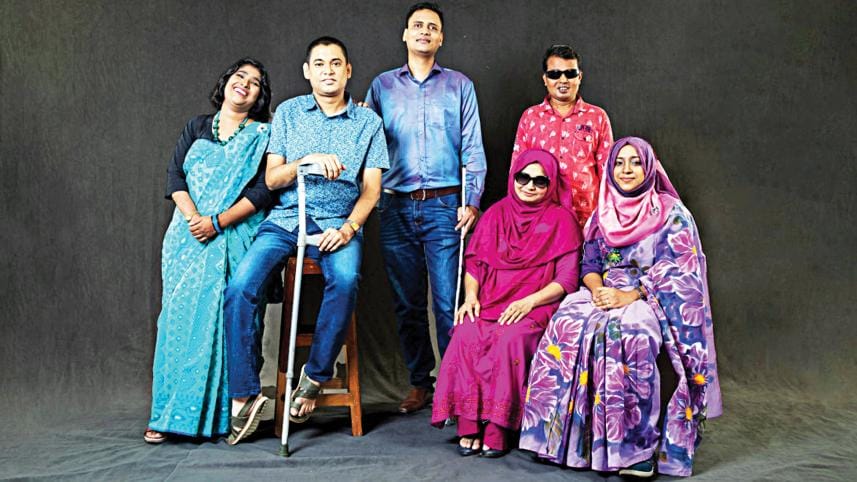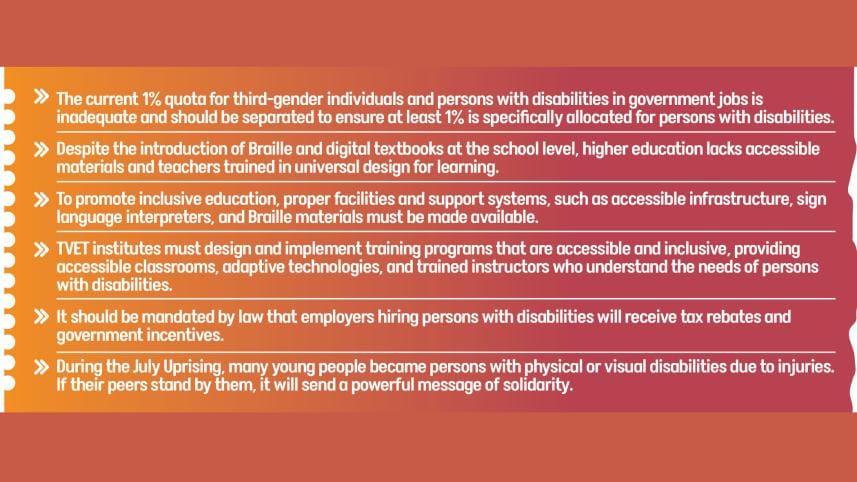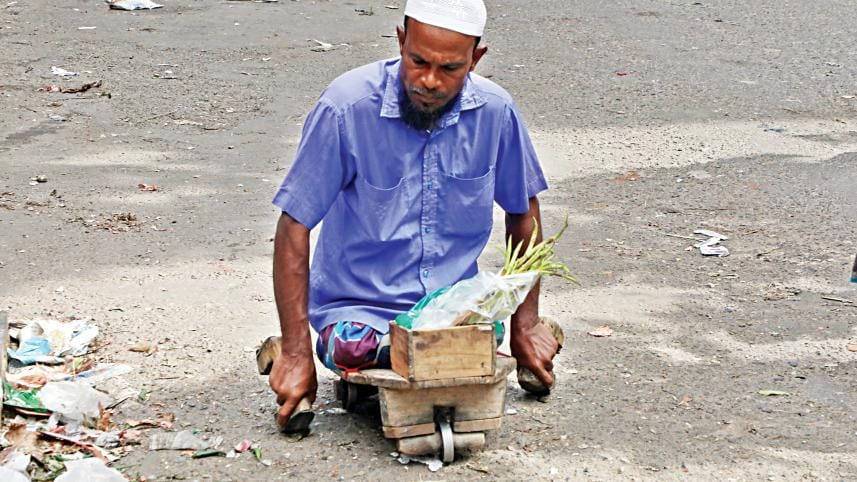Deep-rooted stigmas hinder social inclusion of persons with disabilities

The Daily Star (TDS): What is the current status of the initiatives aimed at identifying the unique needs of persons with disabilities?
Mohua Paul (MP): The Joint Secretary of the Jatiyo Protibondhi Unnoyon Foundation (JPUF) under the Ministry of Social Welfare has initiated a plan to conduct 12 workshops targeting different types of disabilities, as outlined in the Rights and Protection of Persons with Disabilities Act 2013. These workshops aim to identify the unique needs of persons with disabilities and develop a plan based on the findings.
In the initial meeting, discussions focused on the participants. The JPUF is introducing a new approach, asking experts working with various disabilities—such as autism, cerebral palsy, down syndrome, intellectual, visual, hearing, and speech disabilities—to provide updates on the current situation to help develop a comprehensive plan. This approach is more inclusive and participatory compared to previous methods, where consultations were limited to specific days of celebration like Autism Day or International Day of Persons with Disabilities.
This new strategy actively involves stakeholders from disability groups, OPDs (Organisations of Persons with Disabilities), and disability-focused organisations, ensuring their voices are integral to the planning process. Additionally, OPDs and disability organisations are adopting a twin-track approach (mainstream and disability-specific) to foster inclusion. Besides OPD leaders and disability activists, we formed a Disability Watch Group, from that group we also met with the honorable Chief Advisor to share the current scenario and recommendations to include disability inclusion aspects in different reforms.
TDS: What are the most pressing barriers people with disabilities face in accessing basic rights, particularly education, employment, and public spaces in Bangladesh?
MP: A major challenge is the negative attitudes of families, society, and policymakers, who often believe persons with disabilities cannot contribute or be independent. These stigmas severely limit their access to education, employment, and public spaces.
Persons with severe disabilities, particularly those who use assistive devices like wheelchairs, crutches, or tri-cycles, often face significant mobility challenges due to inaccessible environments. Lack of accessible transportation and infrastructure prevents many from leaving their homes, hindering access to healthcare and education.
Persons with visual disabilities face challenges in education, with limited availability of accessible formats like Braille and digital versions of textbooks. While some progress has been made at the school level, gaps remain in higher education, with textbooks and teachers lacking necessary training in universal design for learning.
Similarly, persons with speech and hearing disabilities struggle with communication barriers in education. The absence of sign language interpreters in most institutions limits their ability to follow lessons.
In employment, negative attitudes and inaccessibility persist. Many employers lack awareness about disability inclusion. The current 1% quota for third-gender individuals and persons with disabilities in government jobs is inadequate and should be separated to ensure at least 1% is specifically allocated for persons with disabilities.
Even when hired, persons with disabilities often face inaccessible work environments and lack of reasonable accommodations, hindering their job retention. Additionally, employers often fail to recognise the skills and potential of persons with disabilities, and there is a lack of patience in providing necessary support.

TDS: What are the primary challenges in mitigating skill gaps, and what needs to be done to address them?
MP: The challenges in addressing skill gaps for persons with disabilities are multi-faceted, including the lack of tailored training programs, inaccessible TVET institutes, and a disconnect between training providers and employers. Many TVET institutes lack necessary accessibility features such as ramps, sign language interpreters, and Braille materials, preventing enrollment. Additionally, training programs often fail to align with job market demands.
To address these challenges, TVET institutes must offer accessible, inclusive programs with accommodations like adaptive technologies and trained instructors. They should also collaborate with local employers to align training with market needs and facilitate job matching. OPDs can play a vital role in bridging these gaps by advocating for inclusive training, mentoring trainees, and raising employer awareness.
At Access Bangladesh Foundation, we actively work on skills development and employment for persons with disabilities. We offer training, organise job fairs, and collaborate with local TVET institutes, employers, and government agencies for job matching and self-employment initiatives. In my office, we have three employees with disabilities who perform exceptionally well, proving that with the right support and training, persons with disabilities can be valuable assets to any team.

TDS: How far are we from achieving an inclusive Bangladesh?
MP: When I started, awareness about disabilities was minimal, but over the last three decades, societal integration has improved. However, we are still behind in providing adequate facilities for an inclusive society. To build an inclusive Bangladesh, we must adopt universal design, as 99% of our infrastructure is inaccessible.
While persons with mild disabilities are finding jobs, those with severe disabilities like visual, intellectual, or cognitive impairments, along with those with hearing or speech disabilities, face barriers despite their education and skills.
TVET institutes must prioritise disability inclusion, enhance accessibility, and offer tailored training to boost employability. Additionally, reasonable accommodations should be made in education, health, and employment. Technology has opened job opportunities, especially for freelancing in fields like content writing and web development. Despite ongoing efforts, the employment rates for persons with disabilities, both in government and private sectors, remain low.
TDS: How effective do you think current policies and laws are in supporting inclusivity, and what areas need immediate reform?
MP: The Rights and Protection of Persons with Disabilities Act 2013 is a good law but lacks certain provisions. When the law was made, the sexual and reproductive health and rights aspect as well as disability inclusive climate change adaptation aspects were not addressed separately, though it should have been. Moreover, the law has not been fully implemented. In light of this act, the action plan was made in 2019, which will end in 2025. However, only minimal work has been done, even as the five-year period is about to end.
We also have National Employment Policy 2022, National Skill Development Policy 2022, Bangladesh National Building Code 2020, Standing Orders on Disasters 2019, which cover different areas to ensure the meaningful participation of persons with disabilities. It is high time we started implementing these policies as per their action plan.
TDS: Which areas should the government address to eliminate the discrimination faced by people with disabilities?
MP: I believe that the implementation of existing laws must be ensured with an action plan and target. The target should be set for all government and non-government offices. I have been advocating for a long time that if offices are instructed that out of every 10 employees, one must be a person with a disability. According to law, employers could receive tax rebates for hiring them. If employers focus on these issues, more employment could be created.
The cases of physical and sexual abuse against women and children with disabilities linger for years. There should be a timeframe to resolve these cases. I know a girl whose case of rape has been ongoing for 7 to 8 years.
Besides, if a person with disabilities is not properly educated, they will be left out of the mainstream. The government should invest more in the education and employment sectors. If a person has a job, they can take care of their family, manage their own expenses, and gain respect.

TDS: What role can the young people play in building a more inclusive Bangladesh?
MP: Young people have a crucial role to play in fostering inclusivity. They can start by changing their own attitudes and perceptions about persons with disabilities. Simple acts of support, such as helping a classmate with disabilities to access study materials or accompanying them to educational institutions, can make a big difference.
When I was young, I saw many young volunteers doing social work willingly. I often get very disappointed that the support I received during my youth is rarely seen nowadays. But I believe bringing back that spirit is important and today's youth have the ability to bring that spirit.
Young people can also advocate for policy changes and participate in initiatives that promote disability inclusion. For example, they can volunteer with organisations working for persons with disabilities or organise awareness campaigns in their communities. By standing with their peers with disabilities, young people can help create a more inclusive and equitable society.
During the July Uprising, many young people became persons with physical or visual disabilities due to injuries. If their peers stand by them and ensure they are not forgotten, it will send a powerful message of solidarity and can contribute to achieving a truly inclusive Bangladesh.
The interview was taken by Saudia Afrin.




 For all latest news, follow The Daily Star's Google News channel.
For all latest news, follow The Daily Star's Google News channel.
Comments